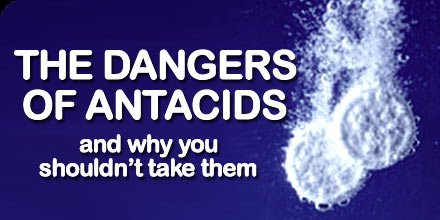
Antacids help to treat heartburn (indigestion). They work by changing the stomach acid that causes your heartburn.
You can buy many antacids without a prescription. Liquid forms work faster, but you may like tablets because they are easy to use.
All antacids work equally as well, but they can cause different side effects. If you use antacids often and have problems with side effects, talk with your doctor.
When to Use Antacids
Antacids are a good treatment for heartburn that does not happen very often. Take antacids about 1 hour after eating or at the time heartburn usually happens after you eat. If you are taking them for symptoms at night, do NOT take them with food.
Antacids cannot treat more serious problems, such as appendicitis, a stomach ulcer, gallstones, or bowel problems. Talk to your doctor if you have:
- Pain or symptoms that do not get better with antacids
- Symptoms every day or at night
- Nausea and vomiting
- Bleeding in your bowel movements or darkened bowel movements
- Bloating or cramping
- Pain in your lower belly, on your side, or in your back
- Diarrhea that is severe or does not go away
- Fever with your belly pain
- Chest pain or shortness of breath
- Call your doctor if you need to use antacids on most days.
Side Effects of Antacids
You may have side effects from taking these medicines. Antacids are made with three basic ingredients. If you have problems, try another brand.
Brands with magnesium may cause diarrhea.
Brands with calcium or aluminum may cause constipation.
Rarely, brands with calcium may cause kidney stones or other problems.
If you take large amounts of antacids that contain aluminum, you may be at risk for calcium loss, which can lead to weak bones (osteoporosis).
Antacids can change the way your body absorbs the other medicines you are taking. It is best to take any other medicine either 1 hour before or 4 hours after you take antacids.
Talk to your doctor or pharmacist before taking antacids on a regular basis if:
You have kidney disease, high blood pressure, or heart disease.
You are on a low-sodium diet.
You are already taking calcium.
You are taking other medicines every day.
You have had kidney stones.
Source: Medline Plus

